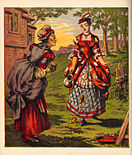The fairies (Perrault)

The fairies (French original title: Les Fées ) is a fairy tale by Charles Perrault . It appeared in his collection Contes de ma Mère l'Oye from 1697 .
content
A widow loves her wicked older daughter, who is like her, and hates the younger, who is kind like her father and who always has to work. He meets a fairy in the form of a poor peasant woman at the well, asks for water and gives her for the courteous help that in future flowers and gemstones will fall out of her mouth while talking. The mother also sends the older one, who takes the most beautiful silver carafe with her, but is so unfriendly to the fairy who appears as a princess that snakes and toads fall out of her mouth. The younger one has to flee and meets a prince in the forest who marries her. But the older one dies lonely. The narrator draws morals: decency is worthwhile, and friendliness is more than money.
Explanations
Perrault paralleled the behavior of the opposing sisters several times. As a farmer's wife, the fairy examines how far the friendliness of some goes, and as a princess, how far the unfriendliness of the other goes. Why the title suggests several fairies remains unclear. The mother calls the mother who has returned home her daughter for the first time, and then continues, saying that she has to send “her daughter” (i.e. the older one) there (“There, Fanchon, just see ...”).
Compare with Straparola No. 4 Biancabella , in Basiles Pentameron III, 10 The three fairies , IV, 7 The two small cakes and V, 2 The months and Grimm's fairy tale No. 13 The three little men in the forest (ATU 403), No. 24 Frau Holle and no. 201 Saint Joseph in the forest .
Text output
- Charles Perrault. All fairy tales. Reclam, Ditzingen 2012, ISBN 978-3-15-008355-0 , pp. 90–94, 138 (translation by Doris Distelmaier-Haas after Charles Perrault: Contes de ma mère l'Oye. Texts établi, annoté et précédé d ' un avant-propos par André Cœuroy, Editions de Cluny, Paris 1948).





